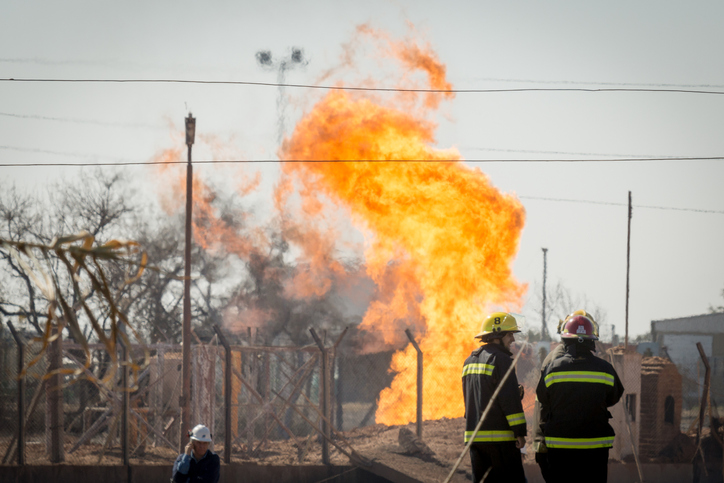
The Trump Administration is continuing its efforts to reduce or eliminate vital workplace and environmental safety regulations, with the U.S. Department of Transportation’s Pipelines and Hazardous Materials Safety Administration (PHMSA) targeting rules intended to prevent explosions, spills and other accidents along the 2.4 million miles of pipelines that crisscross the nation.
Industry Insider Appointed to Head Pipeline Regulatory Agency
The PHMSA is tasked with inspecting the country’s vast pipeline network, issuing regulations that address pipeline construction, operation, and maintenance, and taking enforcement action when pipeline laws and regulations have been violated.
The agency also establishes safety regulations for rail transport of hazardous goods, such as crude oil and toxic chemicals.
In September 2017, the Trump Administration nominated Howard “Skip” Elliott, an industry insider and a former group vice president for CSX Transportation, to oversee the PHMSA.
Though he had been working in the freight rail industry for more than 40 years, Elliott had no prior government service experience. However, he did have strong backing from industry groups.
Despite his lack of regulatory experience, Elliott was confirmed by the U.S. Senate in October 2017.
Department of Transportation Targets More than a Dozen Safety Regulations
From the moment he first began campaigning, President Donald Trump promised to eliminate what he and his industry supporters deemed to be “unnecessary” regulations.
During his first year in office, the President’s appointees at the Department of Transportation – including PHMSA head Elliott – worked to make that goal a reality, weakening or eliminating, more than a dozen critical safety and regulatory protections designed to protect workers, prevent fatal bus and truck accidents, detect sleep disorders among commercial drivers, and reduce the number of catastrophic plant and refinery explosions.
The PMHSA, for example, recently proposed eliminating the current pipeline safety classification system that requires operators to take extra precautions in high-density population areas. Instead, the Administration wants to allow pipeline operators to conduct their own risk assessments and decide for themselves what extra safety measures – if any – are needed.
While the Administration claims that the move would save the industry more than $1 billion over the next decade, a PMHSA report given to Congress in 2016 advised against the changes based on extensive industry and public input.
PMHSA Reconsidering Regulation of Underground Natural Gas Storage Facilities
The PHMSA is also reconsidering a December 2016 interim final rule to regulate underground natural gas storage facilities that was inspired by a massive methane leak at the Aliso Canyon natural gas storage facility near Los Angeles, California.
That leak began in late 2015 and continued into February 2016, forcing more than 11,000 people to leave their homes.
According to the Associated Press, the PHMSA is reconsidering the proposed regulations at the request of industry, which wants some of the rules to be voluntary. Storage facility operators are also want 8 years to implement the new standards rather than one.
The PHMSA has indicated that it will not enforce the portions of the rule that have raised industry concern while they are under consideration.
PMHSA Reviewing Regulations Proposed After Deadly San Bruno Pipeline Explosion
Finally, the PMHSA is reviewing stronger reporting and inspection regulations that were proposed in response to a catastrophic pipeline explosion that devastated the northern California suburb of San Bruno in 2010.
The blast and resulting fire killed 18 people, injured scores of others and destroyed more than 100 homes.
The rules – which would have required pipeline inspections within 72 hours of a major weather event or natural disaster, as well as more frequent inspections using tools that can examine the inside of pipes — were on the verge of becoming law when President Trump took office in January 2017.
The PMHSA agreed to review the proposed regulations just three days after Trump’s inauguration, after fielding concerns from so-called “important stakeholders.”
Where You or Someone You Love Injured in a Pipeline Explosion or Accident? Contact Our Undefeated Pipeline Explosion Lawyers for a Free Consultation by Calling 1-888-603-3636 or Click Here.
With more than $1 billion won for our clients, including hundreds of people injured or tragically killed in connection with pipeline explosions in Texas, Louisiana and throughout the United States, our Undefeated Pipeline Explosion Lawyers have the resources and experience needed to ensure that our clients receive the maximum compensation possible for all of their injuries and losses.
If you or someone you love was hurt in a pipeline explosion or accident, and you have questions about your legal options, please call 1-888-603-3636 or Click Here to send us a confidential email via our “Contact Us” form.
All consultations are free and, since we work exclusively on a contingency-fee basis, you’ll owe nothing unless we win your case.